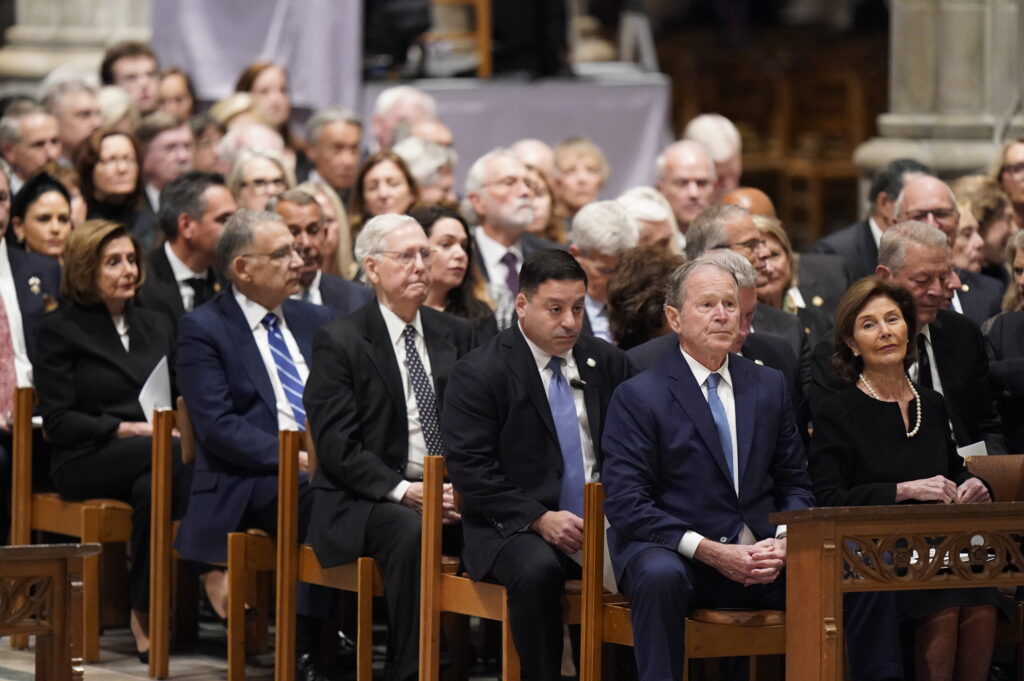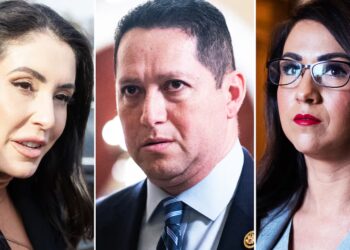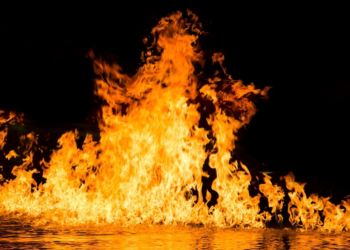What was not said at former vice president Dick Cheney’s funeral on Thursday was as clear as anything that was.
It was a service in sepia. The more than 1,000 people who gathered in Washington National Cathedral — including two former presidents, four former vice presidents and congressional leaders from opposite sides of the aisle — were there to do more than mark the passing of an often controversial individual with whom many had profound disagreements. Their presence in the pews summoned images of a bygone era when raw partisanship was not what defined leadership.
Just as conspicuous was who wasn’t there: any leading figure from the current administration, which dominates the levers of power in today’s Washington as few have before it.
Instead, as if to underscore how much things have changed, President Donald Trump spent the morning sending out social media posts in which he accused a half-dozen Democratic lawmakers of “SEDITIOUS BEHAVIOR, punishable by DEATH!” All veterans of the military or intelligence, their supposed capital offense was recording a video in which they reminded current armed services members that they do not have to follow illegal orders.
Cheney, who died Nov. 3 at the age of 84, is widely regarded as the most powerful vice president in U.S. history.
His was a singular rise within the institutional and political structures of his day: at 34, the youngest White House chief of staff ever; a six-term Wyoming congressman and second-ranking leader of House Republicans; and a wartime defense secretary before joining George W. Bush’s presidential ticket in 2000.
The darkness of his perceived role in the Bush administration’s aggressive national security policies after 9/11 was such that he was often described as Darth Vader, the villain of the Star Wars franchise — a comparison Cheney said he didn’t mind.
In the final years of his life, his image underwent another transformation, as he joined his daughter, former congresswoman Liz Cheney (R-Wyoming), in breaking with their party to oppose Trump after the Jan. 6, 2021, attack by his supporters on the U.S. Capitol.
“In our nation’s 248-year history, there has never been an individual who is a greater threat to our republic than Donald Trump,” the elder Cheney said in a statement announcing he would be voting for the Democratic nominee, Vice President Kamala Harris, in the 2024 presidential election.
Trump has not made any public comment on Cheney’s death. But he has frequently denounced the Bush administration’s interventionist approach to national security, calling the Iraq War “a big fat mistake” based on a lie that Iraqi leader Saddam Hussein had weapons of mass destruction. After Cheney endorsed Harris, Trump responded on social media by calling him “the King of Endless, Nonsensical Wars, wasting Lives and Trillions of Dollars, just like Comrade Kamala Harris.”
And while Cheney made no secret of his dismay at how Trump has transformed the Republican Party, it is also worth pointing out a viewpoint the two had in common. Throughout his career, Cheney pushed hard for policies that expanded the powers of the executive branch. He believed in particular that the reform measures passed by Congress after Watergate put too many restraints on what the president could do. What Cheney probably did not foresee, however, was how a president like Trump would take those powers to unprecedented levels.
Trump was not mentioned or even alluded to during Thursday’s funeral. Instead, eulogists portrayed Cheney as a genial grandfather, a man of the West who loved fishing. His daughter Liz’s tribute ended with famous words of comfort spoken over Shakespeare’s Hamlet as he died: “May flights of angels sing thee to thy rest.”
The restraint was a stark contrast from the anger and passion of a memorial that had taken place in the same cathedral seven years before, during Trump’s first term, for Sen. John McCain (R-Arizona), another Republican foe of Trump. McCain’s funeral was a service that the New Yorker’s Susan B. Glasser described as “a meeting of the Resistance, under vaulted ceilings and stained-glass windows.”
McCain himself had asked Trump’s two predecessors, Bush and Barack Obama, to speak. That, too, was meant to be a signal of what it meant to rise above political grievances, given that both Bush and Obama had beaten McCain in presidential contests.
Neither former president mentioned Trump by name, but in their words praising McCain’s character, it was impossible to miss the contrast they were drawing.
Bush noted: “Perhaps above all, John detested the abuse of power.”
“John cared about the institutions of self-government, our constitution, our bill of rights, rule of law, separation of powers,” Obama said.
Bush spoke again on Thursday, and recalled his decision to pick Cheney, who was directing the search for his running mate, to take that role himself. “His talent and restraint exceeded his ego,” Bush said. “People always saw something in the man solid, reliable and rare.”
To which Bush might have added, qualities that have become rarer than ever in today’s politics.
The post What the Cheney funeral says about current U.S. and GOP politics appeared first on Washington Post.




